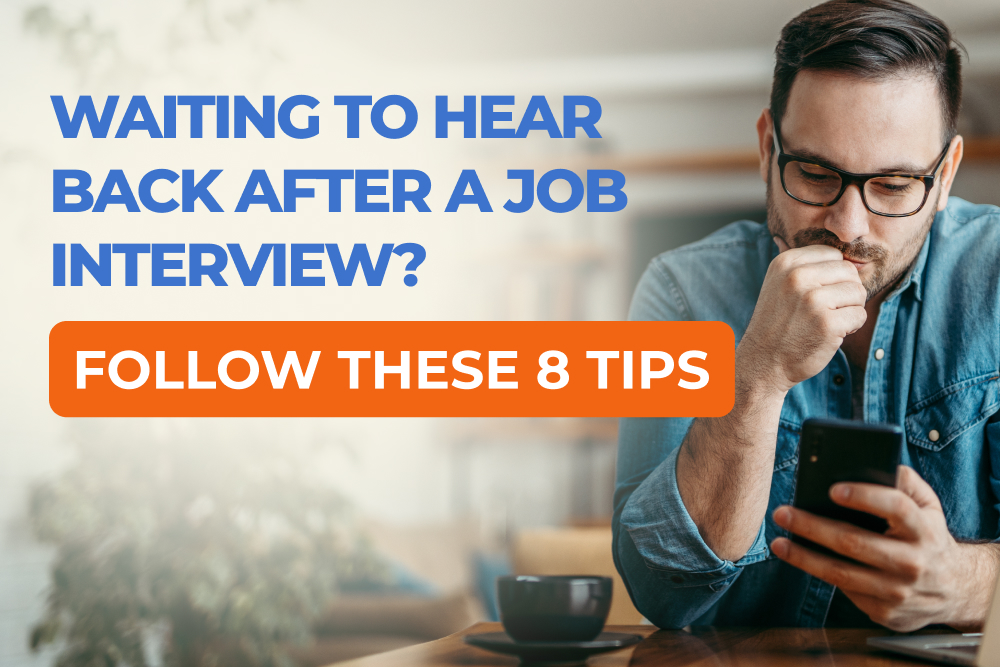The phase after a job interview can be both exhilarating and nerve-racking. Waiting to hear back from a job is scary and you should find ways how to respond in such situations.
In this blog, we’ll give you 8 tips on what to do when waiting to hear back after a job interview. Know that your actions during this time can influence the final decision. So, let us wait patiently but respond politely with persistence.
1. Send a Follow-Up Email After Interview:
After an interview, you can send a follow-up email. A follow-up email can show that you are interested in the job. Below are pointers on sending a follow-up email:
- Thank Them: You should start by thanking the interviewer. Expressing goodwill is a great way. Being grateful for the interview and the time that you were given is good.
- Reiterate Your Interest: You should use words to show how excited you are about joining the team.
- Mention Key Points: You can mention something specific you talked about in the interview.
- Ask About Next Steps: Don’t be afraid to ask about what comes next.
- Polite Sign-Off: Be as polite as possible when signing off.
How Long After Interview Do You Need to Wait to Send a Follow-Up?
You’ve aced the interview and left a lasting impression on the hiring team. But now you’re faced with the question: How long after an interview should you follow up?
Timing is key, and in the world of post-interview follow-ups, the sooner, the better. Aim to send your follow-up email within 24 to 48 hours after the interview. This window allows you to maintain the momentum you’ve built and show your enthusiasm for the position.
Crafting the Perfect Follow-Up Email
There are many ways to be polite and professional. Writing a follow-up email after interviews is one of them. Let’s break down how to follow up after an interview that leaves a positive impression:
- Be Grateful: Showing politeness may increase your likability and goodwill.
- Show Enthusiasm: Letting them see how passionate you are for the job is a good trait to have and show.
- Ask About Status: Politely ask about the current status of the hiring process. Knowing the status is a good way to weigh your options
- Reiterate Skills: Remind them of your relevant skills. Telling them how your skills fit the role can help
- Mention the Next Steps: If they’ve mentioned a timeline, refer to it. If not, you can ask about the next steps.
- Close Professionally: Wrap it up with a polite closing.
2. Be Patient But Persistent
Waiting after an interview is scary, but being patient can help you in this situation.
However, patience is not the only thing you need. You also need to be persistent. There are many things you can do while you wait for a response.
Below are tips on how to be both patient and persistent:
- Give Them Time: After sending your follow-up email, give the company some time to respond. You don’t want to rush them by urgently emailing a few times. If after 1 week after the interview there’s still no response, it means, you were not chosen.
- Follow Up Politely: If you haven’t heard back after about a week, it’s okay to send a gentle follow-up. This will give you and them time to consider the application.
- Respect Their Process: Companies have their own timelines. Respect that they might not respond immediately. Because companies have their own processes, you can’t rush them into responding to your email.
- Stay Positive: Not hearing back doesn’t necessarily mean bad news. Keep your spirits up!
3. Reflect on the Interview
Use this time to reflect on the interview. What did you learn? How did you perform? Identify areas where you excelled and areas you can improve upon.
Here’s how to make the most of this reflective process:
- Assess Your Performance: Analyze your responses – were they clear and concise? Evaluate moments of confidence and areas of stumbling.
- Identify Your Strengths: Spotlight standout instances that showcased your skills, helping you recognize your natural strengths.
- Address Weaknesses: Pinpoint where you fell short – struggling to explain achievements or answer specific questions – to improve for next time.
- Consider Your Non-Verbal Communication: Reflect on body language, eye contact, and demeanor to ensure they align with your words.
- Review the Company and Role: Check if you accurately conveyed an understanding of company values and genuine interest in the role.
- Learn from Mistakes: See errors as opportunities to learn and consider how to handle similar situations better in the future.
- Adapt and Improve: Practice responses, refine storytelling, and align experiences with role requirements using insights gained.
- Boost Your Confidence: Use identified successes to enhance confidence and set the stage for future interviews.
4. Continue Your Job Search
You’ve just aced that job interview, and the excitement is palpable. But before you become too fixated on that one opportunity, here’s a valuable piece of advice: don’t put all your eggs in one basket.
The waiting period after an interview can be an ideal time to broaden your horizons and continue your job search on multiple fronts.
- Maintaining Momentum and Reducing Pressure: By actively exploring other job opportunities, you keep your job search moving forward and ease the stress of waiting for one response.
- Diversifying Your Options: Considering different roles prepares you for changes in circumstances and ensures you’re adaptable to unexpected shifts.
- Enhancing Your Skillset: Reviewing various job requirements helps you identify valuable skills for growth, whether technical or soft skills.
- Strengthening Your Negotiation Position: Exploring multiple options empowers you to negotiate better offers by using competing offers as leverage.
- Avoiding the Emotion Trap: Don’t let your emotions ride on a single job; instead, diversify to handle successes and rejections more resiliently.
5. Send a Thank-You Note
You’ve probably done this already, but if not, send a thank-you email to your interviewers. This is a polite gesture that keeps you on their radar and reinforces your interest.
Start with a genuine appreciation for the interview opportunity, conveying respect for their time. Keep the email concise, positive, and professional; save questions and negotiations for later.
6. Engage on Professional Networks
A crucial step in the waiting period after a job interview is to strategically connect with your interviewers on professional networking platforms such as LinkedIn. This effort serves as a proactive demonstration of your ongoing interest and commitment to the role and the company.
By fostering these connections, you open a window to stay updated on the latest news, developments, and accomplishments within the company. This approach showcases your dedication to staying informed and connected to the organization’s progress.
Connecting with your interviewers on LinkedIn goes beyond just a digital handshake; it’s an opportunity to extend your professional network and enhance your career prospects. As you interact with their posts, liking and occasionally commenting on industry-relevant updates, you subtly position yourself as an engaged industry player with a genuine passion for the field.
This interaction reinforces your image as someone who’s not only interested in the job but is also enthusiastic about contributing to the broader industry conversation.
It’s important to maintain professionalism in these interactions. While the purpose is to stand out and display your interest, striking the right balance is key.
7. Stay Active
Engage in activities that keep your mind off the waiting period. Pursue hobbies, exercise, and spend time with loved ones – anything that keeps you occupied and reduces anxiety.
8. Prepare for the Next Steps
Consider what the next stages could be if you’re selected. Research the company culture, prepare for potential follow-up interviews or assessments, and envision how you can contribute to the role.
Signs You Will Not Get the Job Offer
We know waiting to hear back after a job interview is scary. How can you know you won’t get the job? These signs might help you. Let’s chat about these signs:
- No Response After a While: If you’ve waited longer than they said you would, it might not be the best sign.
- No Follow-Up Email: Sometimes, the company won’t send a follow-up email if you don’t get the job.
- Short Interview Time: If your interview was really short, it might mean they’re not seriously considering you.
- Ghosting from the Company: If they suddenly stop replying to your emails or calls, it could be a hint.
- Quick Hiring Process: If they hire someone shortly after your interview, you might not be their choice.
Ready for Your Next Job? Get in Touch with the Experts at Help Resource!
With these 8 invaluable tips in your arsenal, you’re well-equipped to navigate the waiting game after your job interview. At Help Resource, we’re not just here to provide guidance – we’re your partners in your journey to employment success. As specialists in connecting individuals with temporary staff positions, we understand the twists and turns of the job market adventure.
Embrace each step as part of your larger expedition toward landing that dream job. Our team is dedicated to helping you make the most of your opportunities, ensuring you stand out and shine throughout the process. Remember, your commitment to staying informed, engaged, and proactive can make all the difference.
Ready to take your next step? Contact us today to see how we can be your compass in this exciting journey. Your dream job is waiting – and with Help Resource by your side, it’s closer than ever before.
 (212) 461-4044
(212) 461-4044



